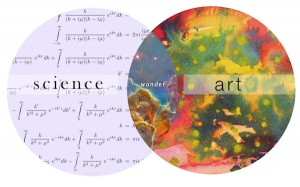by Naomi L. | March 18, 2015 | Blog, Creative Writing |
I mentioned at the beginning of January that it would be difficult for me to keep up with writing because I would be particularly busy this year. I’m currently in the middle of pursuing a Master’s degree in Marine Ecology, so much of my time is being occupied with science. And with the various types of writing I’ve been trying to manage at the same time, that’s gotten me thinking about the similarities and differences between writing artistically and writing scientifically.
So to take advantage of my position between both worlds, I’d like to start discussing on my blog the comparisons between art and science. There are so many points to note, however, that the best way to go about it would be to create a whole subcategory around this topic! That’s why I decided to distribute my observations among several posts. To start off, here’s a brief discussion on the similarities and differences between art and science when it comes to reading. Enjoy!
How the Art is like the Science
Whether it’s for artistic inspiration or scientific knowledge, reading is reading at its core, simple as that. We read for one main reason: to acquire new ideas and information. That’s why when we read prose of any form, we always look for the same fundamental outline behind the content.
The first thing we seek is that big opener: a killer title and a few great introductory lines to hook us from the get-go. These are what help us decide whether the rest of a piece is worth reading, so a good first impression is always important. A striking title will draw our attention to the piece as a whole, and the first few lines after that will give us a sense of the author’s style and direction for the rest of the work.
From there, we move on to the introduction. Whether it’s the opening scene of a novel or the initial paragraphs of a scientific paper, a good introduction properly sets the tone and establishes the theme of the work, so that by the time we get to the heart of it, we understand what it is we’re reading about. That’s when we want to start seeing action. Conflict exists as much in fantasy worlds about magic beings as it does in the real world of scientific discoveries, and we want to see it resolved through the characters’ or the author’s methods until a conclusion is reached either through climactic scenes and denouement or analyzed results and discussions. And let’s not forget that satisfying takeaway feeling we seek when the reading is done!
So reading fiction and reading non-fiction are actually quite similar in many ways. But perhaps it’s in their differences that the true beauty lies…
How the Art is unlike the Science
Of course, outside of a basic structure, art and science differ significantly in their overall purpose. In one, we seek to lose ourselves in narrative, to feed our imagination with fictitious accounts of people who (in most cases) exist only in our heads. In the other, we seek to fill our minds strictly with the truth and consequently expand our knowledge and understanding of the real world around us. Perhaps that’s the greatest deciding factor when choosing which to read: whether we want to engage in fiction or reality.
 Art is intended to appeal to our creative desires. We indulge in artistic composition because it offers an escape from the common and tedious details of everyday life. Even true stories offer this release when narrated creatively enough, which is why even the most fascinating of real-life tales can only be considered such when told with a touch of art to embellish the facts. Literature is first and foremost a form of art, and thus any written work takes skill in creative technique in order to draw us in and keep us hooked to the very last word.
Art is intended to appeal to our creative desires. We indulge in artistic composition because it offers an escape from the common and tedious details of everyday life. Even true stories offer this release when narrated creatively enough, which is why even the most fascinating of real-life tales can only be considered such when told with a touch of art to embellish the facts. Literature is first and foremost a form of art, and thus any written work takes skill in creative technique in order to draw us in and keep us hooked to the very last word.
Science, on the other hand, appeals to our logical side. Those of us who seek knowledge about the real world indulge in scientific papers and non-fiction texts to satisfy our natural human curiosity. Unlike fiction that freely comes in various styles, scientific papers must always follow the same basic outline: title, abstract, introduction, materials and methods, results, and discussion. We always know exactly what to expect when we read academic texts, so we can focus on the content and zero in on the information we want. Writing itself is something of a science, for our minds have long been trained to search for a logical sequence in order to make sense of any piece of prose. If a written work is worth the time to read, we’ll come out a little smarter for it.
When it comes to creative writing, art and science are quite different in many ways, but they can also be surprisingly similar. I hope you’ll enjoy exploring the “likes and unlikes” between my two favorite topics with me in the future! Thanks for reading!
by Naomi L. | March 16, 2015 | Blog, Word of the Week |
Word: patronize
Pronunciation: PAY-trə-nyz / PA-trə-nyz
Part of Speech: verb
Definition: treat with an apparent kindness that betrays a feeling of superiority
Source: Oxford Dictionaries
Today’s vocabulary post features another word with a wide gap between the time I first heard it and the time I learned what it meant. When I was a kid, I would often hear people refer to others’ actions as “patronizing” or tell someone not to “patronize” them, but it wasn’t until I was a little older that I even bothered to look the word up. Until then, I relied on context to help me understand what was being implied, though in truth it was fairly easy to figure out anyway, given the air of condescension that always came with the word.
To “patronize” someone is to treat them with a phony sort of kindness that poorly masks a sense of superiority on the part of the speaker. Generally used in the adjective form “patronizing”, the word is derived from the Old English word “patron”, which in turn traces back to the Latin noun patronus, meaning “defender” or “protector”. This word is derived from the noun pater, which means “father”.
Despite being the most common meaning, bearing a condescending attitude is not the only definition for “patronize”. Note that in some cases, it refers to the act of frequenting a store, theater, restaurant or other establishment as a customer. As a sub-definition, it can also mean to “give encouragement and financial support to a person or a cause”, generally an artist or organization. Most people probably associate the word with its first definition, though, so for general fiction, you’re more likely to use that one than the others. If you often write dialogue involving one character talking down to another, then “patronize” is definitely a good verb to remember for your stories! Good luck!
What are your thoughts on this word? Any suggestions for future “Word of the Week” featured words?
by Naomi L. | March 13, 2015 | J.C. Wolfe's Writing, Poetry |
I do so love the winter cold,
With weather brisk and sweet.
But when I freeze too long,
I start to miss the summer heat.
For when the warmest months arrive
And bring the scorching sun,
It’s time to set your work aside
And start the summer fun.
The beaches fill with people
Seeking peace along the shore.
With white sands and clear blue waters,
They could hardly ask for more.
The laughs of many children
Can be heard throughout the day.
Vacation time has started
And they’re finally free to play.
The scent of fresh cut grass
Will begin to fill the air,
While a hundred ice cream flavors
Will be tasted everywhere.
I do so love the summer heat,
With weather bright and bold.
But when I burn too long…
I start to miss the winter cold.
by Naomi L. | March 11, 2015 | Blog, Creative Writing |
Ready to celebrate National Grammar Day? Then you’d better hop in a time machine and jump back to last week, because it was March 4th. Sorry! Being the total ditz/busy grad student that I am, I neglected to mark the date on my calendar and completely missed my chance to kick off Grammar Day on my blog. That’s OK, though, because every day is a good day to appreciate grammar!
To mark the occasion, the good folks over at Grammarly have created a quiz to help you determine what kind of grammar nerd you are. Take the quiz and share your result in the comments below!

And while you’re at it, why not take a moment to try out their grammar checker? It’s quick, highly accurate, and best of all, free! Prolific writers, take note: you can also subscribe to a premium account on Grammarly.com for as low as $11.66 a month to gain full access to a spelling and grammar checker ten times more powerful than your word processor!
So what are you waiting for? Proofread your texts with Grammarly and start celebrating proper use of grammar today! Happy Grammar Day!
Oh, and in case you’re wondering, I’m a Pedant’s Grammarian. No surprises there!

Today’s creative writing post is brought to you by Grammarly, the World’s Best Grammar Checker. All opinions expressed in this article are my own. For more information on Grammarly, visit http://www.grammarly.com/grammar-check. Thanks for reading! Happy writing!
by Naomi L. | March 9, 2015 | Blog, Word of the Week |
Word: soliloquy
Pronunciation: sə-LI-lə-kwee
Part of Speech: noun
Definition: an act of speaking one’s thoughts aloud when by oneself or regardless of any hearers
Source: Oxford Dictionaries
Here’s another poetry-related word that I appreciate for its dramatic applications. It’s not uncommon for characters in stories to find themselves alone with their thoughts, so it stands to reason that they would express those solitary thoughts aloud now and then. And where there’s theatrical drama, you know there’s a poetic word to define exactly what’s happening in a given scene. In this case, that word is “soliloquy”.
A “soliloquy” is a speech one gives in solitude or regardless of anyone listening. It’s a type of monologue typically spoken by a character in a play. The word comes from the Latin noun soliloquium, which is comprised of two roots: the adjective solus “alone” and the verb loqui “to speak”.
An excellent example of a “soliloquy”, as well as my personal favorite, is Juliet’s balcony speech from Shakespeare’s Romeo & Juliet. In Act II, Scene II of the play, there is a brief passage between the moment Romeo arrives in the Capulet orchard and the moment he begins proclaiming his love to her when Juliet confesses her true feelings for him without knowing he’s hiding below and listening. Generally being a kind of speech, I suppose a “soliloquy” can be considered talking to yourself taken to the next level. If you write characters who make a habit of talking to themselves, you’ll no doubt be able to work a “soliloquy” or two into your stories! Have fun!
What are your thoughts on this word? Any suggestions for future “Word of the Week” featured words?

 Art is intended to appeal to our creative desires. We indulge in artistic composition because it offers an escape from the common and tedious details of everyday life. Even true stories offer this release when narrated creatively enough, which is why even the most fascinating of real-life tales can only be considered such when told with a touch of art to embellish the facts. Literature is first and foremost a form of art, and thus any written work takes skill in creative technique in order to draw us in and keep us hooked to the very last word.
Art is intended to appeal to our creative desires. We indulge in artistic composition because it offers an escape from the common and tedious details of everyday life. Even true stories offer this release when narrated creatively enough, which is why even the most fascinating of real-life tales can only be considered such when told with a touch of art to embellish the facts. Literature is first and foremost a form of art, and thus any written work takes skill in creative technique in order to draw us in and keep us hooked to the very last word.



Recent Comments